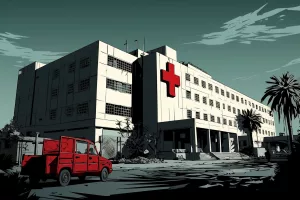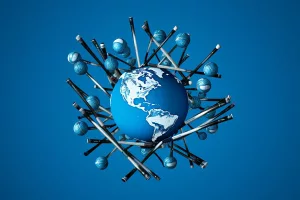The Portfolio Committee on Infrastructure Development and Property Management in the Gauteng Provincial Legislature is set to revisit Mayibuye Primary School in Tembisa to assess any progress made since the school’s construction completion in 2017 and establish whether learners have started using the facility. The school has remained unoccupied for years after its completion, and the Committee aims to assess if any progress has been made in resolving the issue and holding the responsible individuals accountable. The Committee will also visit New Kempton Park High School and Lake Side Primary School to address other infrastructure challenges faced by schools in the region.
Cape Town has seen a decrease in fireworksrelated complaints during Guy Fawkes festivities, with law enforcement officials receiving 225 calls about unauthorized fireworks discharge, a decrease from last year. However, officials still face challenges in some neighborhoods, and the unpredictable nature of fireworks discharge makes it difficult to apprehend culprits. Awareness and community involvement are crucial in combating unlawful activities and antisocial behavior. Despite the progress made, the city still faces challenges in addressing Guy Fawkes celebrations and ensuring the safety of its inhabitants yearround.
A scandal has emerged in South Africa’s Dr. Ruth Segomotsi Mompati District Municipality involving the procurement of a nonexistent R38 million call centre. The North West Provincial Legislature Portfolio Committee on Premier, Finance, Cooperative Governance, Human Settlements and Traditional Affairs is investigating the mismanagement of public funds meant for service delivery. The investigation uncovered a complex web of deception and corruption, including violations of the Municipal Finance Management Act and Municipal Systems Act. The Committee demands justice for the people affected by the scandal, while the fight against corruption in South Africa continues.
Moqhaka Local Municipality in the Free State of South Africa has welcomed a R430 million infrastructure project known as Maokeng Extension 10 and 13. The project will offer 5300 serviced stands and necessary public amenities to the local community, including schools and recreational facilities. The initiative is set to provide a significant financial boost to the municipality and promote local economic growth by allocating 30% of the project’s value to local subcontractors. Additionally, the distribution of title deeds to rightful owners is aimed at restoring dignity and confirming property ownership.
Beijing Jiaotong University has awarded an Honorary Professorship to South African Minister Blade Nzimande in recognition of his contributions to education and to strengthen ties between the two countries. Minister Nzimande expressed his gratitude for the honor and acknowledged the support and friendship from China throughout his career. The prestigious recognition presents an opportunity for deeper partnerships and enhanced collaboration in education and innovation.
The National Student Financial Aid Scheme (NSFAS) is facing a crisis due to irregularities and mismanagement, which could severely impact the futures of many young South Africans. Minister Blade Nzimande has demanded a response from the NSFAS Board and requested a detailed account of their participation in the process, as well as a comprehensive plan to implement the report’s recommendations and investigate allegations made by the former CEO. The board needs to take prompt action to rebuild trust and stability as the NSFAS is vital for funding higher education in South Africa.
Cape Town will experience disruptions in water supply due to maintenance work and infrastructure upgrades. Residents in affected areas should make alternative arrangements for their water supply during this period and store enough water for their needs. The planned works will ensure a more reliable and efficient water supply network for the residents in the future.
Celebrating the UAE’s 52nd National Day and the Strengthening Ties with South Africa
The UAE and South Africa share a strong bond that began with the establishment of diplomatic relations in 1994. They maintain flourishing economic ties, with the UAE being South Africa’s largest trading partner in the Middle East. Both nations are committed to promoting peace, dialogue, and support for marginalized communities. They invest in each other and foster a positive image of robust collaboration and integration with other nations and peoples worldwide. As the world faces ongoing global challenges, the UAE and South Africa remain steadfast in their dedication to promoting peace and cooperation.
South Africa, along with Brazil and Ireland, is calling for an immediate ceasefire in Gaza and for Israel to comply with international law to protect civilian lives. The ongoing violence has caused extensive devastation and loss of life, with numerous civilian targets falling victim to Israeli bombardment. The deliberate airstrikes on fleeing civilians represent grave violations of international humanitarian law and qualify as war crimes. Foreign nationals and Palestinian civilians should be allowed to exit Gaza swiftly, and Israel must adhere to international law and refrain from targeting these civilians in hospitals, ambulances, schools, apartment buildings, and private vehicles.
Ilse De Wet and Liezel Short have made history as the first female leadership duo of the Two Oceans Marathon board. As chairperson and vicechairperson, respectively, they bring expertise in marketing, event organization, and leadership to the board and signify progress towards gender equality in sports management. Their appointment inspires and encourages women to pursue leadership roles in all aspects of life. The new leadership promises a bright future for the Two Oceans Marathon, with a renewed sense of optimism and a shared vision for the event’s ongoing legacy.
Julius Malema, the leader of the Economic Freedom Fighters, opposes the Springboks’ emblem and team colors, which he claims symbolize “white supremacy at the highest level.” Malema seeks to challenge the perception that rugby is a sport solely for white people and aims to reclaim rugby as a sport for all South Africans. His call for a new name, emblem, and team colors that embody the country’s democratic principles rather than “white supremacy” has struck a chord with those who wish to see a more inclusive South African sports scene.
South African Minister of Higher Education, Science, and Innovation, Dr. Blade Nzimande, has been awarded an Honorary Professorship from Beijing Jiaotong University, highlighting the potential for increased collaboration between South Africa and China in science, technology, and innovation. This partnership can aid in South Africa’s railway development, learning from the success of Beijing Jiaotong University’s scientific research and vocational training integration. Dr. Nzimande expresses gratitude and pledges to support the ongoing advancement of the respected university, learning from its achievements to help South Africa conquer poverty and eradicate inequality.
South Africa is getting ready for the third Intergovernmental Negotiating Committee on Plastic Pollution, which aims to create an international legally binding agreement to end plastic pollution and marine litter by the end of 2024. Minister of Forestry, Fisheries, and the Environment, Ms. Barbara Creecy, is hosting a stakeholder engagement meeting to solidify South Africa’s negotiation position for the conference. The event represents a crucial milestone in the global effort to combat plastic pollution and will focus on addressing the entire plastic lifecycle.
MotiMoves, a free online entrepreneurship program, has become the primary sponsor of South Africa’s women’s field hockey team as they aim to compete in the 2024 Olympics in France. With R30 million in funding over 12 months, the sponsorship exemplifies a deep faith in the potential of South African women’s hockey. The team is competing in the African Hockey Road to Paris tournament and has already captivated numerous fans throughout South Africa and beyond.
Experience the rich cultural and culinary offerings of Cape Town with these top cooking courses. From the BoKaap Cooking Tour that takes you on a guided walk and interactive cooking workshop, to the musicinfused Food Jams and the traditional African cooking at Pahari Restaurant, there’s something for everyone. StirCrazy Cooking offers diverse classes, while Ginger & Lime provides an international flair. Embark on a gastronomic adventure and broaden your culinary horizons with these unforgettable experiences.
Unveiling Cape Town takes readers on a journey through the city’s diverse and enthralling tales. From demands for government accountability to spooky hikers and amended national park fees, to heartwarming exchanges between Springbok captain Siya Kolisi and President Cyril Ramaphosa, Cape Town’s unique character shines through. The article showcases the city’s resilience, collaboration, and humor, culminating in the triumphant homecoming of the Springbok team and the promise of lasting memories for visitors.
















